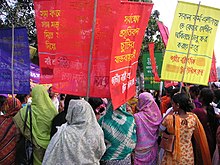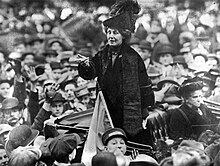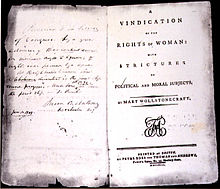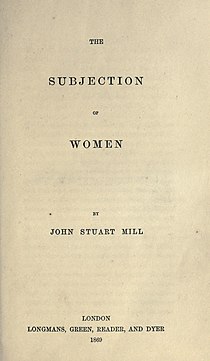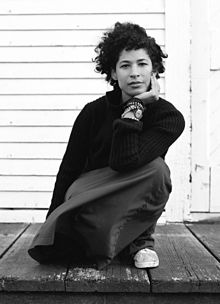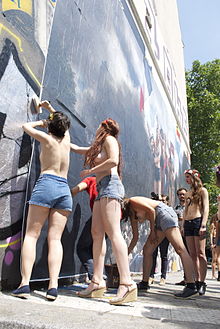Feminism
Feminism is a political and social movement, a political theory and a philosophical perspective that, according to the RAE, postulates the "principle of equal rights for women and men". According to UN Women, feminism in principle fights for gender equality and for the recognition of women as physical persons and subjects of law. Likewise, it maintains that no human being should be deprived of any good or right because of their sex and seeks to ensure that women have equal freedoms as men, in addition to eliminating violence against women, which is mostly carried out by men.
It arose around the 18th century with the publication of the work A Vindication of the Rights of Woman, by Mary Wollstonecraft in 1792, and has had an important theoretical, political and philosophical development since then. Feminism focuses its analysis on the role of patriarchy in structuring unequal power relations between men and women. Feminism criticizes the androcentric vision of society, which it seeks to transform in order to achieve its objectives of a more just and egalitarian society.
As a social movement, it has sought to promote women's rights, including civil and political rights such as voting and holding public office; economic rights such as receiving equal pay for equal work, exercising the powers of private law, such as signing contracts, social rights such as receiving an education, exercising their reproductive rights and protecting other women from different forms of violence such as abuse, harassment sexual and domestic violence. Feminism has also played an important role in denouncing and changing gender stereotypes. As the feminist movement gained relevance in the academic world, it generated a body of theory that has given rise to disciplines such as feminist geography, the history of feminism, or gender studies. Feminist political philosophy serves as a field for developing new ideals, practices, and justifications for how institutions should be organized and rebuilt.
As a social movement made up of organized groups, feminism has historically developed in a succession of stages or phases, referred to as "waves." In each phase or «wave», very diverse ideas and concepts, theories, strategies, actions and currents have been developed, which is why, in some cases, the notion of «feminisms» is used to denote this diversity. As a movement for the transformation of society, it has a vocation to influence the way in which reality is conceptualized and in scientific discourse.
Over the years, many feminist movements and ideologies have developed, representing different points of view and goals. Traditionally, since the 19th century, the liberal feminism of the first wave that sought political and legal equality through reforms within the framework of liberal democracy was opposed to the movements of proletarian women of the labor movement that, over time, became became socialist feminism and Marxist feminism based on class struggle theory. Since the 1960s, both traditions have also been in opposition to radical feminism, which emerged from the radical wing of second-wave feminism and called for a radical reordering of society to eliminate male supremacy. These three streams are sometimes referred to as the "big three" feminist schools of thought.
Since the late 20th century, many new forms of feminism have emerged, some of which have been criticized for considering only the perspectives of white, middle-class, and/or upper-class women, college-educated, heterosexual, or cisgender These criticisms have led to the creation of ethnically specific or multicultural forms of feminism, such as black feminism and intersectional feminism.
Etymology
Although the issue of equality was covered in publications from the 17th century, such as De l' Égalité des hommes et des femmes (1622), by Marie Le Jars de Gournay or De l'Egalité des deux sexes (1673), by François Poullain de la Barre, the neologism French féminisme was formed at the end of the XIX century, from the Latin word «femina» and the suffix "isme". The first use of the term, although with a different meaning, occurs in 1871, when a medical student, Ferdinand-Valérie Fanneau de la Cour, used it in his thesis, Du fèminisme et de l'infantilisme chez les tuberculeux (On feminism and infantilism in tuberculosis patients), to refer to the pathology that afflicted men who suffered from this disease. According to his thesis, there was an arrest in the development of the body, which led to the weakening of the sick individual, and, finally, there was a feminization of the male body. It is unlikely, however, that this term was disseminated, both because of its context and the situation in which it occurs.
Months later, in 1872, Alexandre Dumas Jr., writer and playwright, took up the term, now with a political meaning, in his pamphlets "Feminism" and "The Man-Woman" to discredit the men who strongly supported the movement of women demanding access to their citizenship rights. According to the French historian and philosopher Geneviéve Fraisse, Dumas used the term feminism in the context of a debate on issues such as adultery and divorce. It was not until the 1880s, when Hubertine Auclert, a French suffragette, took up the term, now with a connotation aimed at movements that sought social and political justice for women.
For its part, the Dictionary of the Spanish language included the neologism for the first time in 1914 and did not modify the definition until 1992 (from the Latin femĭna, woman, female, and -ism). woman, to whom he grants capacity and rights previously reserved for men". In its second meaning, a movement that demands equal rights for women as for men. This second meaning is incorporated in the 1992 edition. The updated edition defines feminism (l fr. féminisme, and this from lat. femĭna 'woman' and the fr. -isme '-ismo') as a principle of equality of rights of women and men. And as a movement that fights for the effective realization in all orders of feminism.
Several modalities of feminism are recognized, among others: cultural feminism, liberal feminism, radical feminism, ecofeminism, anarchofeminism, difference feminism, gender feminism, equality feminism, feminism Marxist feminism, socialist feminism, separatist feminism, philosophical feminism, Islamic feminism, and lesbian feminism. All of this leads to talk of “feminisms” (in the plural) and not of a single “feminism”. In this line, feminism is defined as the heterogeneous set of ideologies and political, cultural and economic movements whose objective is equal rights between men and women.
Timeline
European feminist studies, among which stand out those carried out in Spanish, distinguish feminism and Enlightenment as the first phase, also called the feminist polemic.
One of the first women philosophers with feminist principles was Hiparchia, wife of Crates of Thebes. She was a member of the cynical school, so she stripped herself of her possessions, family and behavior according to the society, she left the traditional role given to women and began to wear men's clothes so as not to follow the traditions of the society Greek. Theodore the Atheist, who was laughing at her, asked her why she did not dedicate herself to the tasks of her sex. Hiparchy, aware of what could be revolutionary in her attitude, replied: "Do you think I was wrong to dedicate to study the time that, because of my sex, I should have lost as a weaver?"
Although the controversies about women date back to the Middle Ages and although they start with preciousness, the work of Poullain de la Barre (1673) being noteworthy, it is in the XVIII when the controversy about equality and difference between the sexes is raised with a critical discourse, through the philosophy of the Enlightenment, which was contemporary. The trigger was the publication of the work A Vindication of the Rights of Woman, by Mary Wollstonecraft (1792). The second wave was liberal suffrage feminism, centered on the right to vote and education. It was an interregnum, after the Wars, with the mystical call of femininity. The third wave begins in the seventies with what feminists called "the malaise that had no name", and the analysis of patriarchy, glass ceilings, as well as the situation of women in the rest of the planet where they are not recognized human rights that were declared universal and inalienable. In this third wave follows feminism, which is an internationalism, in the second decade of the 21st century.
Another chronology distinguishes the first wave, which appeared in the late 19th century and early 20th century and focused mainly in the achievement of the right to women's suffrage; the second wave appears in the 60s and 70s and focuses on women's liberation; Finally, the third wave begins in the 1990s and continues to the present day, and is a continuation and reaction to perceived gaps in second wave feminism.
Protofeminism, premodern feminism and memorial of grievances
Protofeminism or premodern feminism is called the protests expressed by women as a "memorial of grievances" and the defense of women that took place in the context of controversies about women, during the period preceding La Enlightenment and that goes back to the Middle Ages. This premodern feminism does not arise from the discourse of exaltation of feminine virtues that is part of the European tradition of the century XIII known as Courtly Love. Nor is it a discourse that claims equality between the sexes, since it moves within the framework of a class society in which the prejudice that it is by divine will that there are different "states" and different ways of serving the master, according to the sexes.
According to Simone de Beauvoir, the first woman to use a pen to defend women was Christine de Pizan, who in the fifteenth century wrote, among other works, what she titled City of Ladies and the one he published under the title Epître au Dieu d'Amour (Epistle to the God of Love).
Now, this defense does not fully conform to the concept of feminism born with the Enlightenment, to modern feminism, which transcends the mere enumeration of grievances and enters the terrain of the vindication of women and the rationalist critique of social structures.
First phase: feminism and Enlightenment
With few exceptions, the main male authors of the Enlightenment relegated the role of women in modernity. Both Rousseau and Kant considered that women, like children, were excluded "by nature" from the right of citizenship. Celia Amorós studied the issue, noting that although feminism was inherent in "the romantic face of the Enlightenment", registering important initiatives even from its earliest stages, would ultimately be an "untrodden path", leading to feminist thought being routinely ignored in studies of the Enlightenment movement.
Among the most notable attempts to include women equally in the rationalist movement were the women's clubs in the French Revolution and the publication in 1791 of the Declaration of the Rights of Women and of the Female Citizen , drawn up by Olympe de Gouges, in order to complete the Declaration of the Rights of Man and of the Citizen approved two years earlier by the National Constituent Assembly of France. But those attempts were "brutally silenced", in Amorós' expression, as evidenced by the ban on women's clubs and the execution of Olympe de Gouges.
A certain liberal literature in favor of women is generated: John Stuart Mill or Nicolas de Condorcet are going to be examples of (male) leaders who defend women's rights, but the emptiness and apparent oblivion of the relegated figure of women within the liberal state, which lasted until the XX century, was not going to be denounced until the appearance of authors like Mary Wollstonecraft, author of A Vindication of Women's Rights, which breaks with the trend of works written to date by women, described as a "memorial of grievances" and goes on to "vindicate", a component essential of feminism.
In the Spanish Empire there were also feminist expressions linked to the Enlightenment. Benito Jerónimo Feijoo wrote the speech "Defense of Women", considered the first treatise on Spanish feminism. Josefa Amar y Borbón in the Royal Aragonese Society of Friends of the Country, defending the equality of women before men. One of her works currently available on the internet is the Speech in defense of women's talent :
Not happy the men with having reserved, the jobs, the honors, the utilities, in a word, all that can encourage their application and reveal it, have stripped the mugers [SIC] until the complacency that results from having an enlightened understanding. They are born, and raised in absolute ignorance: they despise them for this cause, they become persuasive that they are not capable of anything else and as if they were to drink [SIC] talent in their hands, they do not cultivate other skills that they can play with. So much drags the opinion in all matters! If as this gives the main value in all the mugeres to the beauty, and the donaire, gave it to the discretion, we would see them as lawful to acquire it, as they are now to seem beautiful, and kind. Rectify men first of their estimation, that is, they appreciate the garments, which truly deserve it, and do not doubt that the vices of them will be reformed. In the meantime it is not caused to the mugers, who only care to adorn the body, because they see that this is the idol, to which they dedicate their incense.
Second phase (first wave)
The second phase or first wave of feminism refers to the feminist movement that developed in England, the United States and other parts of the world such as Latin America throughout the century 19th century and early XX century.
Originally, it focused on obtaining equality with men in terms of property rights and equal capacity to act, as well as the demand for equal rights within marriage. At the end of the XIX century, efforts will focus on obtaining political rights, specifically the right to vote.
In the 1830s and 1840s, the Peruvian Flora Tristán stood out in the French socialist movement, with works such as The Emancipation of Women, considered a precursor of the modern feminist movement.
A milestone of feminism is the Seneca Falls Convention in New York in 1848, where three hundred activists and spectators gathered at the first women's rights convention in the United States, whose final declaration was signed by about one hundred women. During that time, many utopian socialists had previously addressed the oppression of women, such as the Saint-Simonians who advocated the emancipation of women. Among this group were women such as Angélique Arnaud, Caroline Simon, and Claire Démar. Fourierists, to which Eugénie Niboyet belonged, had dealt with themes such as the need to socialize housework, free love and the need to reorganize society into “phalansteries”. Paraphrasing Fourier, Flora wrote: "It is observed that the level of civilization reached by various human societies is in proportion to the independence enjoyed by women." The socialists Karl Marx and Friedrich Engels recovered Fourier's ideas in La Sagrada Família, where it is argued that “social progress and changes in periods take place in direct proportion to the progress of women towards freedom; and the declines of the social order take place due to the decrease in women's freedom...". Engels wrote about the double historical oppression of women by the State and the marriage relationship in The Origin of family, private property and the State (1884). He expressed that, in the bourgeois family, "the man is the bourgeois and the woman represents the proletarian."This work will be considered a key work for socialist feminism.
At the beginning of the XX century, the suffragettes appeared in the United Kingdom, activists for the women's civic rights, particularly the right to vote. The movement was led by Emmeline Pankhurst and numerous authors and activists, mostly from the United States and the United Kingdom, who are going to take feminism to the field of activism, especially in a context of vindication of equal rights against the State.
The historical events of the moment, especially the abolition of slavery, will be very influential in the future of the feminist movement, being able to find a correlation between the fight for abolition and the fight for women's rights: many of them the leaders of this first current are the wives of abolitionist leaders.
Once the abolition was achieved, contacts between feminists and black women were going to take place, highlighting the great differences in the situation of upper-middle-class white women, the only feminists up to now, with those black women. This encounter is personalized by the figure of Sojourner Truth and her speech Ain & # 39; t I a Woman? (1851). The differences and specific characteristics of the problems of the black woman together with those of the working women (a group that is going to begin to appear) are going to generate frictions and problems such as, for example, the incompatibility of the female model of the working woman with that of the pioneers of feminism.
Significant authors and activists of the first wave of feminism include: Lucretia Mott, Lucy Stone, Elizabeth Cady Stanton, and Susan B. Anthony, many of them linked to abolitionism and influenced by Quaker thought. The character of the predominant feminism at that time vindicates the woman through positive qualities considered feminine such as temperance, pious life or abstention from drinking alcohol. However, this vindication of women through temperance is not detrimental to energetic protests and belligerent activism, with actions such as chaining themselves in public places, breaking shop windows, hunger strikes, civil disobedience, or desperate and extremely dangerous acts such as throwing themselves in front of of the king's horse during a race.
In Argentina, the anarchist Virginia Bolten leads a union feminist movement around the newspaper La Voz de la Mujer (1896-1899), published under the slogan “Ni Dios, ni patrón, ni marido”. A few years later, Bolten joined the board of directors of the Argentine Regional Workers' Federation (FORA). Installed in Uruguay, she participated in the movement that won the right to suffrage for women (the first in an Ibero-American country) and divorce.
The abolition of slavery will come but, to the disappointment of women, race equality does not extend to gender equality, so the feminist movement will have to find its own way, separating itself from the movement abolitionist. After great efforts, the right to vote was achieved in 1918, when in England the vote was regulated for women over thirty years of age and who owned a house. In Germany, suffrage was achieved in November 1918. In 1928, the voting age was equal to that of men. For its part, in the United States, the Nineteenth Amendment of 1920 grants the right to vote in all the states of the country. Most of the large European states are going to take similar measures with some exceptions such as France or Italy, which will still postpone the right to women's suffrage for twenty years.
With the achievement of de iure equality, the first wave will lose its raison d'être, after a period of little activity as far as feminism is concerned. New feminist currents will appear, focused on the progress and social and cultural equality of women and to differentiate them, they will be described as the "Second wave", naming the "First wave" retrospectively.
Romanian Sarmiza Bilcescu (April 27, 1867 - August 26, 1935) was the first woman in Europe to graduate in law from the University of Paris and was the first woman in the world to obtain a doctorate in law, with a thesis entitled On the legal status of the mother (1890), where she showed all the contradictions and the lack of rights of women and, especially, of mothers.
Elisa Leonida Zamfirescu (1887-1973) was the world's first female engineer. In 1909 she enrolled in the Royal Technical Academy in Berlin, "Charlottemburgen", graduating in 1912. Upon registering, the dean tried to convince her to resign, citing "the three kas" ("kirche, kinder, küche ”, “church, children, kitchen”) that defined the profile of women at that time. The directors of the Academy were faced with a new situation: she was the first candidate in the history of the Academy, but she wrote and spoke German perfectly, and she had outstanding knowledge of mathematics, physics, and chemistry. Finally, she accepted it.
Second Wave
The Second Feminist Wave, the Women's Movement or Women's Liberation refers to a period of feminist activity beginning to early 1960s and lasts until the 1990s of the XX century.
Just as the first wave of feminism focused primarily on overcoming legal (de jure) obstacles to legal equality (women's suffrage, property rights, etc.), the second wave it had a wide variety of themes: unofficial (de facto) inequality, sexuality, family, the workplace, and perhaps most controversially, reproductive rights.
In this stage is the Second World War, where companies like Westinghouse Electric made posters that encouraged women to work in the positions that men had left empty by marching to war, that is, war propaganda to invite women to join the workforce, or that they were likewise not for recruitment, but for exhorting already hired women to work harder. But the truth is that the intention to promote the idea of working women was created with the idea that they fulfill their obligation as wives, filling the jobs left by their husbands during the war, almost as if it were a duty. patriotic. From here came the poster Rosie the Riveter also called We Can Do It, which is currently a symbol of contemporary feminism beyond the fact that, in the same way that this poster, many others arose at the end of said war, when many women were practically forced to resign and return to "their true obligations": cleaning, cooking, taking care of the children, etc., since the men were going to occupy the positions again. posts. Thus, it constitutes a paradox for feminism.
Simone de Beauvoir, with her book The Second Sex, Betty Friedan with The Mystique of Femininity, Kate Millett with Sexual Politics or Shulamith Firestone with The Dialectic of Sex are some of the most representative authors of this current of thought. It ends in the nineties with the arrival of the third wave, with postmodern characteristics, which radically diversifies feminism, both in its visions and in its proposals.
Third Wave
Third-wave feminism is a term identified with various branches of feminism whose activism and research in the United States begins in 1990 and extends to the present. The movement arose as a response to perceived failures in the so-called second wave feminism: the awareness that there is no single model of a woman, on the contrary, there are multiple models of a woman, determined by social, ethnic, nationality, social class, sexual orientation or religion.
This current distances itself from essentialism and the definitions of femininity, sometimes assumed as universal and which overestimated the experiences of the upper-middle class of the North American white race. The interpretations given to gender and sex are essential within the third wave, characterized by its post-structuralism. The variety of approaches, proposals, visions of the problems of this current and the lack of a clear common objective reflects the postmodernist character of the third wave of feminism that incorporates multiple currents of feminism having components of queer theory, anti-racism, post colonial, ecofeminism, transsexuality, or the positive vision of sexuality, among others.
The reconsideration of third wave feminism is manifested, for example, in that some feminists of this current have a different perception of female sexuality and have reconsidered the positions towards sex work or pornography of the second wave of feminism. Third wave feminists focus on "micropolitics" and challenge the concept of what is "good" or "bad" for second wave women.
The third wave of feminism emerged as a response to the second wave, but some events marked the beginning of this current, such as the case of Anita Hill, a woman who denounced Clarence Thomas, who was nominated for sexual harassment, for sexual harassment. the Supreme Court of the United States. Thomas denied the allegations, and after extensive deliberation, the Senate voted 52 to 48 in favor of Thomas. In response to this case, Rebecca Walker published an article titled Becoming the Third Wave. in the third wave) in which she declared: «I am not a post-feminism feminist. I am the third-wave" ("I am not a post-feminist, I am the third wave"), Another milestone in the history of the third wave are the debates called "Feminist wars for sex", considered Sometimes like the start of the third wave, they constituted a series of heated debates around positions on sex, prostitution, sadomasochism and transsexuality that pitted the third wave feminist movement against the lesbian feminist community.
Fourth Wave
Impact of feminism on society
Feminism has led to important changes in parts of the world; Thanks to their influence, in many societies women have achieved access to education, the exercise of the right to active and passive suffrage, the protection of their sexual and reproductive rights - including, in some countries, the voluntary termination of pregnancy - among many others that shape the notion of citizenship in democracy. One of the most important contributions of feminism is the theoretical building that different authors have built over the centuries; Feminist theory has introduced into society and the academic world a multitude of new concepts and areas of study that, had it not been for the vitality of the feminist movement, would not have appeared. Among these we can highlight examples such as gender studies, feminist literary criticism, feminist film theory and criticism, feminist legal theory.[citation required]
Feminism has had an important impact on the legislation of a large part of the world's countries and influenced broad areas of the legal system, with laws against gender violence or electoral parity laws: to give a few examples, it is worth mentioning the Law 581 of 2000 in Colombia that imposes a minimum quota of 30% of women; Law 7142 of 1990 of Costa Rica that imposes a minimum of 40%; the Federal Code of Electoral Procedures of Mexico that limits the presence of either sex to 70%; the Law for the effective Equality of women and men in Spain (2007) that establishes the obligation of parity, or the resolution of the Venezuelan Electoral Council of 2008, which requires that party nominations have 50% women, and the Law of Gender Parity in Areas of Political Representation of 2017 in Argentina. In Chile, President Gabriel González Videla signed Law No. 9292, which granted full suffrage to women.
However, in no country in the world has equal pay for equal work been achieved, spontaneous abortion continues to be the cause of death for many women in the world (the third leading cause of maternal mortality in the world) and there are still many countries where women do not have the right to vote equally with men. In this regard, the Executive Director of UN Women, Phumzile Mlambo-Ngcuka, commented that, as of 2015, progress since the end of the century XX had been produced unevenly and equality had not been achieved in any country.
In 2017, "feminism" was declared word of the year by the American dictionary Merriam-Webster, revealing that in 2017 searches for this term increased by 70% compared to the previous year. Analysts consider that feminist movements are expanding pointing out as examples the Ni una menos movement in Latin America, the January 2017 Women's March on Washington or the impact of the Me Too movement ("Yo también") started with the accusations of sexual abuse against the American film producer Harvey Weinstein by various women published on October 5, 2017 by The New York Times and which has spread to other countries.
Key concepts
The broad set of concepts and technicalities used by feminism have a specific approach that must be understood in order to interpret feminist theory adequately, some of the most important are:
Patriarchy
The concept of patriarchy is central to the rationalist critique of society that, as a general rule, feminism makes. Before being reformulated by feminist theory, the meaning of this term corresponded exactly to its etymology: the word "patriarch" is made up of the Greek words "άρχω" (to command) and "πατήρ" (father) and since ancient times it has been called to the social organization that gives primacy to the male part of society, and institutionalizes the influence of the father of the family.
The concept of “patriarchy” was introduced into the feminist debate by Kate Millett, in her book Sexual Politics (1970), and today it is an essential component of almost all approaches to the feminist movement. feminism, in particular, radical feminism. Within feminist theory, patriarchy has come to mean the dominance of the social order by men, which manifests itself in innumerable ways, creating a state of affairs that externally shapes women, all aspects of their existence, through symbolic violence, myths and beliefs that make the situation of subordination "natural". Some examples of patriarchal subordination are:
- Lower wages for women, according to OECD, there is a gender pay gap in member countries of 17 per cent and an estimated 30 per cent of this difference is due to discriminatory causes.
- Sexuality in favor of the male genus, orienting it to the pleasure of the males.
- Influence in areas such as language, which would treat the female gender as an exception against the male “norma” (e.g., by saying “citizens” we would include male and female citizens) or in English, the word woman (woman), who evolved from the ancient English word wifman which means “female human”, while man (man/varon) in ancient English meant "human" to dry, falling into disuse the word werman (male human) around the year 1000-1200 of our era and going to use man to define all human gender and men.
- The system of rewards and punishments of society, which would give more importance to male behaviors than to females, defining sexual roles or stereotypes and which, through patriarchal ideology, are presented as natural and universal. Example of this fact is gender-based violence, which was seen as natural and for centuries abused women blamed themselves and were ashamed for being beaten, until the media and the criticism of the phenomenon questioned that logic.
- It reserves the worst jobs and occupations of women, such as household tasks, which are not usually paid and are covered with little or no social prestige, and in many cases are incompatible with a full professional life.
| Spain | Mexico | |||||
|---|---|---|---|---|---|---|
| Domestic | Extradometic | Total | Domestic | Extradometic | Total | |
| Male | 17:44 | 22:34 | 40:18 | 9:57 | 23:44 | 33:41 |
| Women | 28:52 | 15:32 | 44:23 | 46:01 | 14:52 | 60:53 |
| Average | 23:27 | 18:57 | 42:24 | 29:01 | 27:04 | 56:05 |
| Revista de Economía Crítica, n.o 6. January 2008, pp 145-170 | ||||||
| ISSN 1696-0866 | ||||||
Gender
The concept of «gender» is central to feminist theory, which defines gender (the masculine/feminine) not as a natural reality, inherent to the human being, but rather as a cultural construction. Gender would be the result of immersion in a set of socially constructed values that give rise to the conception of «the feminine» or «the masculine». The merely biological characteristics (sex), through social evolution, have been covered with a set of behaviors, attitudes, perceptions and thoughts; that humanity has imposed on women, linking to biological sexual characteristics a specific image of what "should" be, creating the relationship between sex (male/female) and gender. One of the main objectives of gender theories is to question the belief that biology determines the feminine (or masculine) condition, affirming its social nature.
The dominant sex is that of the human male or male, who, through the patriarchal structure, establishes dominance over the human female or woman. The woman is oppressed because of her sex and the oppression occurs through gender. Because of this, the emergence of gender studies in the United States in the 1970s caused a rupture in other social sciences, which were forced to redefine their paradigms, until then designed in a purely masculine key. Disciplines such as sociology, geography, psychology, anthropology and economics underwent redefinitions as soon as women (sex) appears as an object of study separate from gender. They leave aside the paradigm of biological determinism and a rational construction of the relationship of society with women appears.
Gender as a social and non-biological construction is originally a theoretical construction created by doctors, psychoanalysts, ethnologists and sexologists such as John Money or Robert Stoller, who proposed to distinguish the concept of sex from that of gender, that is, to separate the biological traits, physiological, chromosomal and genetic of the human male and female of the social construction that is made of these sexual biological differences. For example: pink and domestic toys for girls and blue or light blue and action toys and war for children That is gender. From the 1970s until the 1990s, feminists began to embrace gender studies. Gender, from the perspective of feminist gender studies, is what society says a woman should be and what she should not be.
Feminism does not question, in this way, only the construction of femininity and women, but also the concept of masculinity, since both the first and the second form part of the sex/gender system, while that shaped and currently represents a category of anthropological analysis. According to Gayle Rubin, the sex/gender system assigns cultural characteristics and, consequently, artificial and perfectly modifiable, to each of the sexes, an oppression of the patriarchy that would not be inevitable, but a consequence of the social relations that organize the so-called sex/gender system. gender. That is, for each biological sex a certain gender would correspond. Human males correspond to masculinity and females to femininity, with a hierarchy system where the oppressor male would occupy a superior position and dominate the woman, in a situation of subordination and oppressed. The differences would generate hierarchical inequalities, biological differences and political relations between the sexes that, thanks to gender, are unequal and asymmetric in social, legal, political, sexual life, in economic development, access to land, to education, culture and work. According to Marcela Lagarde, the five keys to gender oppression are the inferiorization, discrimination, exclusion, marginalization and expropriation of women.
Androcentrism
Androcentrism is the vision of the world and of social relations centered on the masculine point of view. Androcentrism makes the vision of men the only possible one and establishes a series of paradigms for the study and analysis of reality, which also include the racial, class and age biases of the dominant sector of society.
In the context of social research, a study with an androcentric approach would be "a study, analysis or investigation from the male perspective only, and subsequent use of the results as valid for the generality of individuals, men and women". Practically all intellectual production has been, until well into the XX century, of an androcentric nature, this being an instrumental circumstance for the creation of a female identity tailored to the male (male sector of society).[citation required] Given that throughout human history, the male (and proprietary, white, adult) part of society has been the one to write and theorize about society, androcentrism is a consequence of both than an enabling condition of this mastery. Androcentrism extends to all areas of society in general and intellectual production in particular, affecting areas such as schools and their educational materials, the media, scientific production, public administration, health, the justice, among others. The androcentric bias of a society's intellectual production, in addition to its "gender" character, includes other advantageous conditions such as social class, color, ethnicity or age. The privileges of these social conditions make the vision of the white male, adult and property owner the only possible one, making possible the monopoly of the intellectual vision of society.
A clear example of androcentrism is found in the tenth Biblical commandment:
You will not covet the house of your neighbor; you will not covet women of thy neighbour, neither his servant, nor his maidservant, nor his ox, nor his donkey, or anything of thy neighbour.
Criticism
Theoretical aspects
One of the currents of third-wave feminism, ecofeminism, has received criticism against it for its essentialist nature, which has led to the rejection of such a denomination by feminists who also define themselves as ecologists. Such essentialism is interpreted as a strict and dichotomous vision, a dualism that basically continues to focus on gender differences, and not on common aspects, to the point of relating being a woman with a supposedly superior morality, and tending to show men "with an innately inferior capacity in areas of performance considered significant", for example, by attributing phenomena such as violence to them, and separating them from values such as peace, without there being scientific and practical evidence to support these relationships. This point of view has been denounced as unnecessary in feminism and as a sexist ideology.
According to psychologist Sebastián Girona, the most radical versions of feminism place all the blame on men for the oppression that women have suffered throughout history without recognizing women's own responsibility. This perspective can lead to blaming men for all social ills, and consequently, reify him as the figure of evil and in some cases it can become a hatred or aversion towards men, technically called misandry, which can be manifested openly or subtly..
Feminism has received criticism from conservative ideologies. For example, journalist Naomi Schaefer Riley argues that feminism has harmed women and families by promoting a culture that supposedly regards casual sex as "empowering," rejects the need for a man's presence in the home, and devalues women's domestic work, while inviting the victimization of women. In the same vein, the actress Alessandra Cantini, a candidate for the Forza Italia party, believes that feminism promotes gender terrorism and that the claims of feminism they obey the purpose of overthrowing the capitalist order. The paleolibertarian economist Vanessa Vallejo sees a link between measures such as quota laws and political authoritarianism and collectivism. Both Vallejo and Cantini denounce the way in which these measures could violate principles such as business freedom, or meritocracy.
Criticism of totalitarian tendencies of radical feminism also comes from the sector of egalitarian feminism. For example, Camille Paglia and Christina Sommers accuse "gender feminists" of pigeonholing women in the role of victims of patriarchy and lament an alleged drift towards intolerance and censorship of feminism towards dissident points of view in institutions. academic.
Other concepts of second and third wave feminism have been challenged, such as patriarchy, gender identity, and social constructs.[citation required]
As a supposed equality movement, it denounces the abandonment of feminism to protect and watch over discrimination, exploitation and abuse towards men. For example, Carol Fontena and Andrés Gatica, in an investigation on violence against men, comment on the problem of domestic violence:
In this sense, there is a somewhat unilateral logic in its approach, supported by feminism, which contributed ostensibly to the intervention of this problem, but which has had its costs by pointing out a single type of aggressor: the male, keeping this problem hidden.
Cantini, for his part, believes that "the current status quo discriminates against men as long as there is no humanitarian law that defends them from the abuse they receive."
In addition, certain feminist branches have been supported by sexual segregation as a measure to prevent sexual violence, which despite what the feminist Victoria Robles Sanjuán comments: “Segregation by sex it is a blatant form of discrimination” has been applied in public places and teaching.
Disagreement Movement
Some groups of men and women have shown their disagreement against feminism, as was the case with the Internet campaign called "Women against feminism" in 2014 in reaction to the "#YesAllWomen" campaign, or the "Front of men against feminism" in Germany. In 2013 Patriarch Kirill of the Russian Orthodox Church questioned feminism arguing that "it is very dangerous and can destroy Russia".
In the early 1990s, the American conservative journalist Rush Limbaugh began to spread the pejorative term "feminazi", associating some feminist currents with Nazism. The term has been criticized for promoting the belief that Hitler was a feminist. Feminist Gloria Steinem has also criticized Limbaugh, exposing how Limbaugh supports most of the positions that Nazism held against feminism.
Media executive Steve Bannon, chief adviser to former US President Donald Trump and director of the far-right outlet Breitbart News, and Milo Yiannopoulos, a British far-right journalist, also argued that feminism it was a disease like cancer.
Feminisms
- Anarcofeminism
- Antifeminism
- Cyberfeminism
- Feminist theory
- Ecofeminism
- Christian feminism
- Decolonial feminism
- Gender feminism
- Feminism of difference
- Feminism of equality
- Philosophical Feminism
- Gypsy feminism
- Islamic Feminism
- lesbian feminism
- Liberal feminism
- Male feminism
- Black feminism
- Postcolonial feminism
- Radical feminism
- Socialist feminism
- Feminist theology
- Feminism in Argentina
- Feminism in Chile
- Feminism in Ecuador
- Feminism in the Caribbean
- Feminism in Honduras
- Feminism in India
- Feminism in Mexico
- Feminism in Paraguay
- Sexual segregation
Contenido relacionado
Vicente Blasco Ibanez
Sinatra Doctrine
Ethnology

